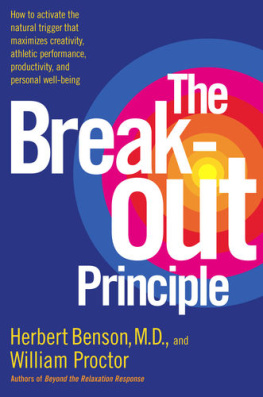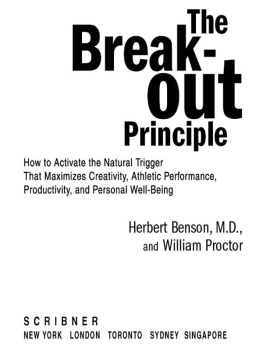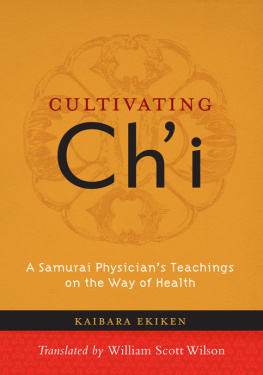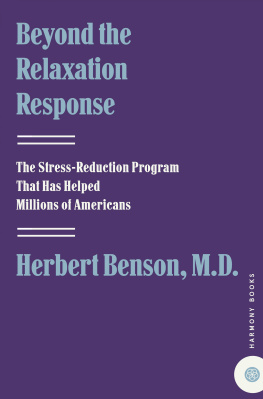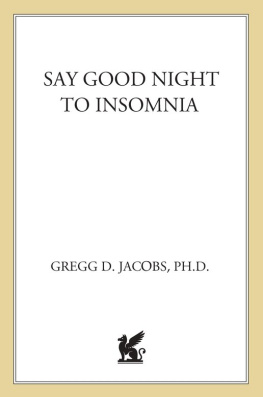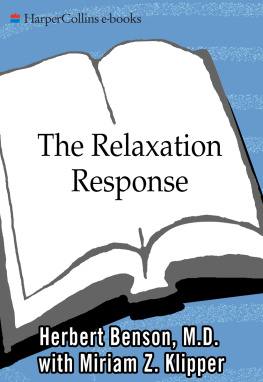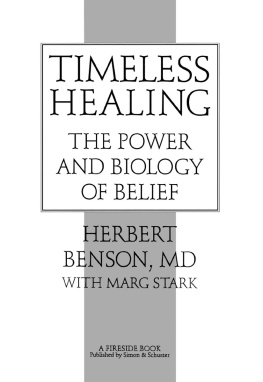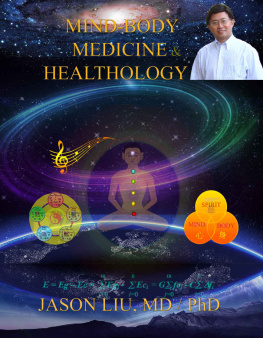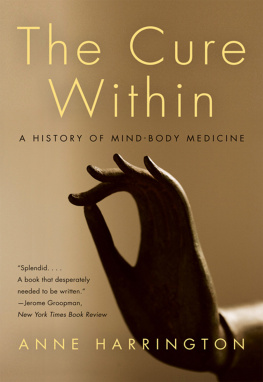Copyright 1979 by Simon & Schuster
A Division of Gulf & Western Corporation
All rights reserved
including the right of reproduction
in whole or in part in any form
Published by Simon and Schuster
A Division of Gulf & Western Corporation
Simon & Schuster Building
Rockefeller Center
1230 Avenue of the Americas
New York, New York 10020
www.SimonandSchuster.com
Illustrations by Jerome Reicher,
Arrco Medical Art and Design, Inc.
Designed by Edith Fowler
Library of Congress Cataloging in Publication Data
Benson, Herbert.
The mind/body effect.
Bibliography: p.
1. Medicine and psychology. 2. Mind and body.
I. Title.
R726.5.B46616'.001'978-13543
ISBN 978-1-5011-4092-1
ISBN-13: 978-1-9821-3882-0 (eBook)
TO JENNIFER AND GREGORY
FOREWORD
F OR MORE than a decade, my primary research interests have focused upon bridging the disciplines of medicine, physiology, psychology and psychiatry. As a result of these interests, I am convinced that many aspects of the teaching, research and practice of modern medicine can be altered to provide you with better health care. To facilitate the teaching of these concepts, a Behavioral Medicine course has been initiated at Harvard Medical School. A Division of Behavioral Medicine Section has been formed at Bostons Beth Israel Hospital to continue collaborative research in this area and to apply these principles to the care of patients. One of the major tenets of the teaching and practice of Behavioral Medicine is that individuals must assume more responsibility for their own health care. Your health is both your responsibility and that of your physician; it is a two-way proposition.
My hope is that this book will provide a new perspective which will allow you and members of the medical profession to interact better. This book was not written to give specific medical advice concerning personal health care. However, you must understand what can reasonably be expected from medicine. You can adopt a more effective approach to health care by taking an historical perspective. A proper balance between traditional and modern medical practices is necessary so that people can remain well for as long as possible and receive optimal treatment when ill. Without this proper balance, more individuals might become like the woman cited in the Gospel according to St. Mark, who had suffered much under many physicians, and had spent all that she had, and was no better, but rather grew worse.
Since Behavioral Medicine is still evolving, it may be viewed differently by others. For those of my colleagues already working in Behavioral Medicine, I trust that this book will be considered as an attempt to advance an important mutual endeavor. A term other than Behavioral Medicine might have been used: Holistic Health, Holistic Medicine, Wholistic Health, Integral Medicine and Humanistic Medicine are similar approaches.
Almost all the case histories presented in this book have been reported in the medical literature. No examples of my own patients have been cited unless written, informed consent was received.
I have not consistently eliminated the sole use of the male gender when referring to individuals. An excess of the awkward phrases, his or hers, she or he, her or him, would have resulted. I apologize to those who might be offended.
I am indebted to the many investigators and observers who have contributed to the literature concerned with health and disease. Whenever possible, I have acknowledged their contributions in the text.
I gratefully thank Karen D. Crassweller, Jamie B. Kotch and Patricia A. Arns for their superb assistance in the research, development and preparation of this book. I also thank Nancy E. MacKinnon for her interest and excellent secretarial assistance. I acknowledge the contributions of Mark D. Epstein and Martha M. Greenwood, who indirectly aided this book by working on related research projects. For their counsel, I thank David M. Roseman and Carl R. Croce. I am ever indebted to my wife, Marilyn, for her honest, direct and unerringly sound judgments as well as for her patience and support.
Significant aspects of the book were made possible through funds donated in memory of the late Joel Cheney Wells by Mr. and Mrs. Frank M. Brennan. I also gratefully acknowledge the support of Robert L. Allen and William K. Coors. I hope that this book will help to fulfil their faith in the future of Behavioral Medicine. The research and development of the book were also funded, in part, by the following grants from the United States Public Health Service: RR-01032 from the General Clinical Research Centers Program of Research Resources, HL10539 and MH25101.
CHAPTER
E VERY AGE seems to look back fondly at previous generations. More than 4600 years ago, the legendary Yellow Emperor of China asked his divinely inspired teacher, Chi Po:
I have heard that in ancient times the people lived [through the years] to be over a hundred years, and yet they remained active and did not become decrepit in their activities. But nowadays people reach only half of that age and yet become decrepit and failing. Is it because the world changes from generation to generation? Or is it because mankind is becoming negligent [of the laws of nature]?
His teacher answered:
In ancient times those people who understood [the way of self-cultivation] lived in harmony with the arts of divination.
There was temperance in eating and drinking. Their hours of rising and retiring were regular and not disorderly and wild. By these means the ancients kept their bodies united with their souls, so as to fulfill their allotted span completely, measuring unto a hundred years before they passed away.
Our current and more accurate data argue against the concept that previous generations lived longer. We now not only live longer than ever before, but also, through the benefits of modern medicine, enjoy healthier lives. Yet many are still not satisfied with their state of health. Disenchanted with the medical profession, people seek help from various organizations and cults which promise relief from their problems. People also seek health advice from a myriad of books which instruct them what to eat and not to eat, how to exercise, how to relax and how to behave. Why is it that people do not have more faith in the present medical system and turn to it for advice, since medicine has achieved many, truly remarkable advances?
The scientific and medical advances themselves are causing medicine to move away from some of your most basic needs. As our modern technological society developed, time-tested approaches were considered to be unscientific and old fashioned. By adopting an historical perspective, I will show that medicine has made use of worthwhile principles that sustained it for centuries. Since these principles are poorly understood within the framework of modern medicine, they have been largely discarded. However, older practices are compatible with our current scientifically based approaches and should be reincorporated into medicine. We should not replace our recent successful approaches. Rather, the older techniques and approaches should be synthesized with our present practices. With such a synthesis, better health should ensue. Without such a synthesis, medicine will become further removed from what you need. Medicine, as it is now evolving, is increasing its potential to do harm. I am concerned that commercial interests, motivated by financial gain, will increasingly exploit your unmet needs for financial gain and that further ill health and dissatisfaction will result.

